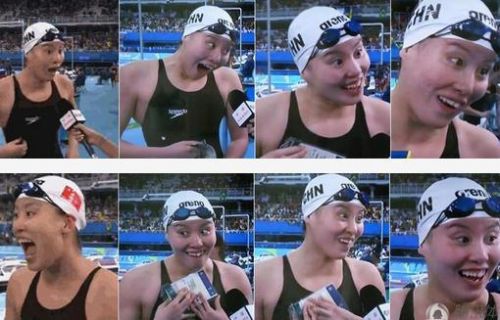Why power of honghuang drove netizens crazy?
- By Thorsten J. Pattberg
 0 Comment(s)
0 Comment(s) Print
Print E-mail China Daily, August 12, 2016
E-mail China Daily, August 12, 2016
|
|
|
Screenshots capture a series of facial expressions of Chinese swimmer Fu Yuanhui during an interview with CCTV after the women's 100m backstroke semifinal on August 8, 2016. |
What have ancient Taoism and the internet got to do with women's 100-meter backstroke swimming final at the 2016 Rio Olympic Games? Everything!
"Really, was I that fast?" said Fu Yuanhui about her seemingly effortless performance in the pool. The 20-year-old came in an unexpected third in the 100m backstroke semifinals on Monday (she won the bronze medal the next day).
Interviewed by a China Central TV sports journalist at edge of the pool, the slightly embarrassed yet evidently overjoyed Fu explained: "It must have been the li of honghuang!" Twenty-four hours later, Fu had become a Weibo star, with thousands of remix videos, motivational posters and image macros.
Li is usually translated as "power". But what is the "power of honghuang"? In Chinese philosophy, honghuang is the "primitive universe". It is, varying from story to myth to TV adaptation (we’ll come to that in a minute), at least 4,000 to as much as 50 million years old and filled with mythical beasts such as Kunpeng the bird, Qilin the giraffe and the kitchen god Chau.
Call li a hidden, superhuman ability if you will — or better still, "the force". According to Taoism canon, in the beginning there was chaos, a prehistoric fiction, the foundation of the solar system perhaps. George Lucas famously borrowed many key Taoist elements — qi became "The Force" — for his multimillion-dollar space saga Star Wars ("Star Wars is Taoism in American garb": China Daily, 24 Dec, 2015).
Acting flabbergasted and thus memorable and most entertaining, Fu put Chinese power into a Greek institution. A proud fan said:"The Greeks invented the Olympic Games, but the Chinese win at it!"
Followers immediately recognized the "power of honghuang" from the recent TV drama Journey of Flower. In it, a Taoist immortal, Bai Zihua (played by Wallace Huo), wonders whether his love interest, the powerful she-demon Hua Qiangu, "can be made not to use her awesome strength", or at least "resist her primitive powers for now". The Taoist show became a sensation in China, reaching hundreds of millions of viewers.
As suggested, most Americans are already very familiar with "primitive power", but through Americanized names. In East Asia, however, Taoism naturally makes sense with moviegoers, gamers and geeks. Akira Toriyama, the Japanese creator of the global Dragonball franchise, accidentally caused one of the greatest "Tao power memes" when in one episode a villain inquired about "Gout's power level" and learned that "it's over 9,000". Goku, of course, is a Taoist immortal (and Buddhist deity) modeled after China’s Sun Wukong — the celestial Monkey King. It means that Tao power is simply over the top and totally off the scale — even the best illustrators and cartoonists know that!
The humor in this global quest to find ever richer puns and slang for explosive awesomeness across all disciplines knows no cultural boundaries. Laozi once said: "The Tao that can be described is not the Eternal Tao." It's perhaps the vaguest, most comical, yet exceedingly versatile "motivational philosophy" that's ever been penned: "Tao acts like water, it does not resist … it conquers all!" He could also have said: "Tao works best in the pool."
Now you might say good-old Taoist literature, or all the Chinese philosophy we’ve paraphrased above, is largely unbeknownst, or trivial, to most sports commentators in the East and West. Albert Einstein, Leo Tolstoy and early European Union proponents were effectively layman Taoists, but then who recalls.
With the internet now being the ever fast-forward, fast-paced dispenser of new cultures and traditions in the world, however, it was perhaps symbolic, and certainly satisfying, to learn that the mysterious "power" helped a down-to-earth, world class backstroke specialist.
The author is a German writer and cultural critic, and author of The Euro-Tao.






